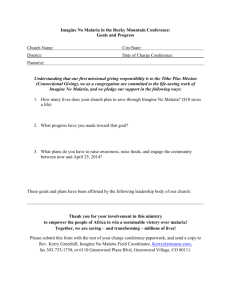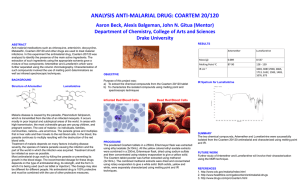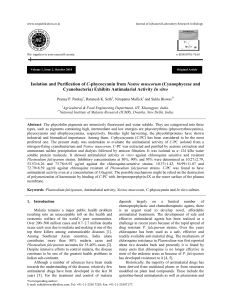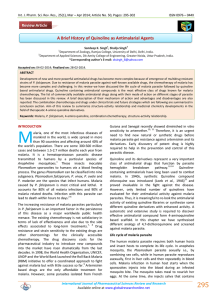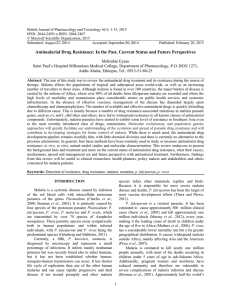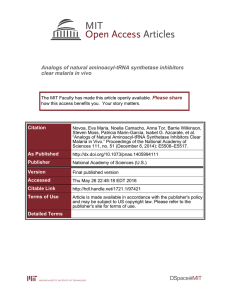collaboration to provide evidence for the malaria research community
advertisement
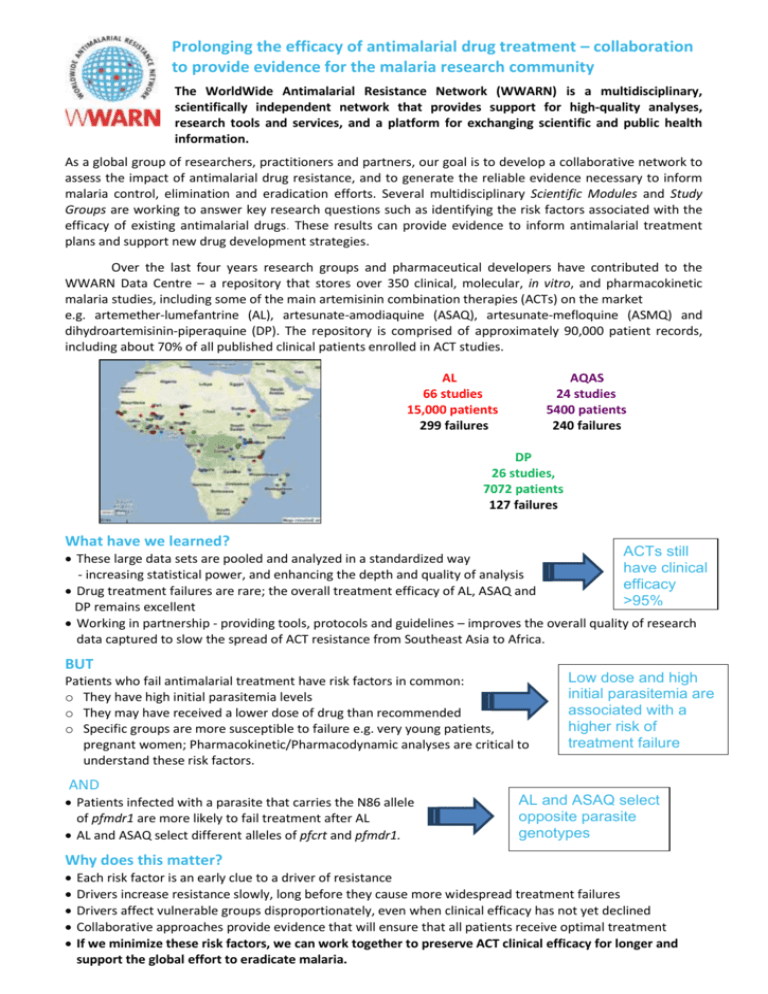
Prolonging the efficacy of antimalarial drug treatment – collaboration to provide evidence for the malaria research community The WorldWide Antimalarial Resistance Network (WWARN) is a multidisciplinary, scientifically independent network that provides support for high-quality analyses, research tools and services, and a platform for exchanging scientific and public health information. As a global group of researchers, practitioners and partners, our goal is to develop a collaborative network to assess the impact of antimalarial drug resistance, and to generate the reliable evidence necessary to inform malaria control, elimination and eradication efforts. Several multidisciplinary Scientific Modules and Study Groups are working to answer key research questions such as identifying the risk factors associated with the efficacy of existing antimalarial drugs. These results can provide evidence to inform antimalarial treatment plans and support new drug development strategies. Over the last four years research groups and pharmaceutical developers have contributed to the WWARN Data Centre – a repository that stores over 350 clinical, molecular, in vitro, and pharmacokinetic malaria studies, including some of the main artemisinin combination therapies (ACTs) on the market e.g. artemether-lumefantrine (AL), artesunate-amodiaquine (ASAQ), artesunate-mefloquine (ASMQ) and dihydroartemisinin-piperaquine (DP). The repository is comprised of approximately 90,000 patient records, including about 70% of all published clinical patients enrolled in ACT studies. AL 66 studies 15,000 patients 299 failures AQAS 24 studies 5400 patients 240 failures DP 26 studies, 7072 patients 127 failures What have we learned? ACTs still These large data sets are pooled and analyzed in a standardized way have clinical - increasing statistical power, and enhancing the depth and quality of analysis efficacy Drug treatment failures are rare; the overall treatment efficacy of AL, ASAQ and >95% DP remains excellent Working in partnership - providing tools, protocols and guidelines – improves the overall quality of research data captured to slow the spread of ACT resistance from Southeast Asia to Africa. BUT Patients who fail antimalarial treatment have risk factors in common: o They have high initial parasitemia levels o They may have received a lower dose of drug than recommended o Specific groups are more susceptible to failure e.g. very young patients, pregnant women; Pharmacokinetic/Pharmacodynamic analyses are critical to understand these risk factors. Low dose and high initial parasitemia are associated with a higher risk of treatment failure failure AND Patients infected with a parasite that carries the N86 allele of pfmdr1 are more likely to fail treatment after AL AL and ASAQ select different alleles of pfcrt and pfmdr1. AL and ASAQ select opposite parasite genotypes Why does this matter? Each risk factor is an early clue to a driver of resistance Drivers increase resistance slowly, long before they cause more widespread treatment failures Drivers affect vulnerable groups disproportionately, even when clinical efficacy has not yet declined Collaborative approaches provide evidence that will ensure that all patients receive optimal treatment If we minimize these risk factors, we can work together to preserve ACT clinical efficacy for longer and support the global effort to eradicate malaria. Join our Session We hope to see you at our oral and poster presentations that summarize our results on the treatment efficacy of artesunate-amodiaquine and artemether-lumefantrine. Visit our booth for a full list of activities. FRIDAY, NOVEMBER 15 Poster - Ric Price Session B Noon – 13:45 Assessing the effect of the recommended artemether-lumefantrine dosing regimen on the risk of treatment failure in patients diagnosed with uncomplicated P. falciparum malaria SATURDAY, NOVEMBER 16 Oral Pres. - Christian Nsanzabana Ballroom Salon 3 / Session 117 08:00 – 10:00 Presentation: Treatment efficacy of artesunate-amodiaquine treatment regimens for uncomplicated P. falciparum malaria: a comparison of fixed versus co-blister formulations Session: Malaria: Chemotherapy II Other panellists: Yesim Tozan, Bernhards Ogutu, Ifeyinwa N. ChijiokeNwauche, Jason W. Bennett, Myaing M. Nyunt, Sean E. Clarke and Nicholas White Look out for New Publications The WWARN Dihydroartemisinin-Piperaquine (DP) Study Group: The effect of dosing regimens on the antimalarial efficacy of dihydroartemisinin-piperaquine: a pooled analysis of individual patient data. PLOS Medicine 2013: In press. Three further papers on the efficacy of artemether-lumefantrine and artesunate-amodiaquine and the role of parasite genotypes are being prepared for submission. Parasite Clearance Study Group: Optimal sampling designs for estimation of Plasmodium falciparum clearance rates in patients treated with artemisinin derivatives. Flegg et al. Malaria Journal 2013: In press. Find out more about our study groups at: http://www.wwarn.org/partnerships/study-groups WWARN Future Scope of Work Using an established multidisciplinary approach, we plan to pursue the following objectives: 1. To provide a platform for partnership where researchers from academic and non-academic institutions, industry and Product Development Partnerships (PDPs) can work together to share knowledge and experience. 2. To maintain and continuously update the WWARN secure Data Centre to facilitate the assembly, analysis and rapid availability of high quality antimalarial efficacy data and to provide timely intelligence for decisions on drug use. 3. To assure the quality of drug efficacy data / assessment by providing tools, services and training materials – the WWARN Toolkit - to support the global malaria research community and facilitate the harmonization of clinical research plans, procedures and protocols. 4. To address critical gaps in information on antimalarial efficacy and antimalarial quality by creating, validating and promoting the use of innovative, standardized tools and supporting the collection of data in areas at high risk of spread of already resistant parasites or developing new resistant strains. 5. To slow resistance and prolong the therapeutic life of existing antimalarial drugs by building partnerships to monitor drug quality, inform drug dosing, and support new drug development. Meet the WWARN Team at Booth 309 Our partners are located in multiple countries across Africa, Asia and Latin America. The WWARN collaborator network includes experts within research institutes, malaria groups, pharmaceutical companies, public health practitioners and drug development organizations worldwide. Stop by to meet the WWARN team: Test our tools and discover our latest initiatives Find out more about our Study Groups See our Collaborator Map – discover a summary of more than 230 WWARN partners and join our network! Visit: www.wwarn.org Twitter: @WWARN or twitter.com/WWARN Facebook: www.facebook.com/AntimalarialResistance
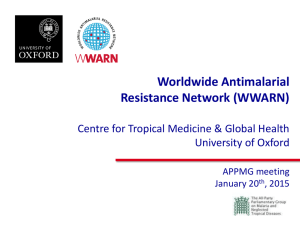
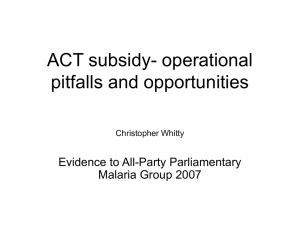

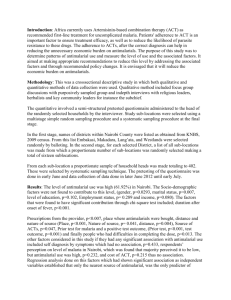
![Quality assurance in diagnostic radiology [Article in German] Hodler](http://s3.studylib.net/store/data/005827956_1-c129ff60612d01b6464fc1bb8f2734f1-300x300.png)
